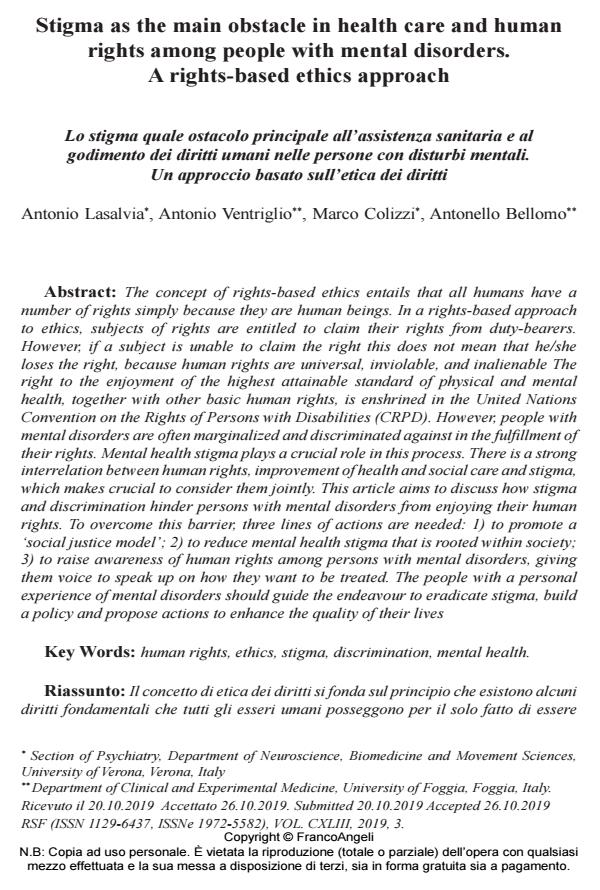Stigma as the main obstacle in health care and human rights among people with mental disorders. A rights-based ethics approach
Journal title RIVISTA SPERIMENTALE DI FRENIATRIA
Author/s Antonio Lasalvia, Antonio Ventriglio, Marco Colizzi, Antonello Bellomo
Publishing Year 2019 Issue 2019/3
Language English Pages 21 P. 133-153 File size 187 KB
DOI 10.3280/RSF2019-003006
DOI is like a bar code for intellectual property: to have more infomation
click here
Below, you can see the article first page
If you want to buy this article in PDF format, you can do it, following the instructions to buy download credits

FrancoAngeli is member of Publishers International Linking Association, Inc (PILA), a not-for-profit association which run the CrossRef service enabling links to and from online scholarly content.
The concept of rights-based ethics entails that all humans have a number of rights simply because they are human beings. In a rights-based approach to ethics, subjects of rights are entitled to claim their rights from duty-bearers. However, if a subject is unable to claim the right this does not mean that he/she loses the right, because human rights are universal, inviolable, and inalienable The right to the enjoyment of the highest attainable standard of physical and mental health, together with other basic human rights, is enshrined in the United Nations Convention on the Rights of Persons with Disabilities (CRPD). However, people with mental disorders are often marginalized and discriminated against in the fulfillment of their rights. Mental health stigma plays a crucial role in this process. There is a strong interrelation between human rights, improvement of health and social care and stigma, which makes crucial to consider them jointly. This article aims to discuss how stigma and discrimination hinder persons with mental disorders from enjoying their human rights. To overcome this barrier, three lines of actions are needed: 1) to promote a ‘social justice model’; 2) to reduce mental health stigma that is rooted within society; 3) to raise awareness of human rights among persons with mental disorders, giving them voice to speak up on how they want to be treated. The people with a personal experience of mental disorders should guide the endeavour to eradicate stigma, build a policy and propose actions to enhance the quality of their lives
Keywords: Human rights, ethics, stigma, discrimination, mental health.
- Prevention in Mental Health Antonio Lasalvia, pp.173 (ISBN:978-3-030-97905-8)
Antonio Lasalvia, Antonio Ventriglio, Marco Colizzi, Antonello Bellomo, Stigma as the main obstacle in health care and human rights among people with mental disorders. A rights-based ethics approach in "RIVISTA SPERIMENTALE DI FRENIATRIA" 3/2019, pp 133-153, DOI: 10.3280/RSF2019-003006